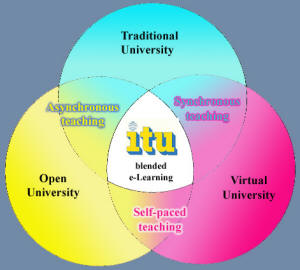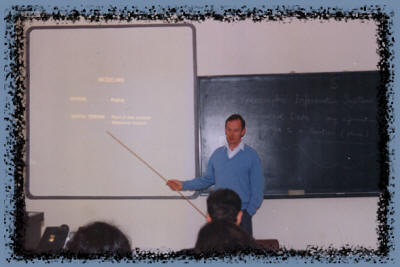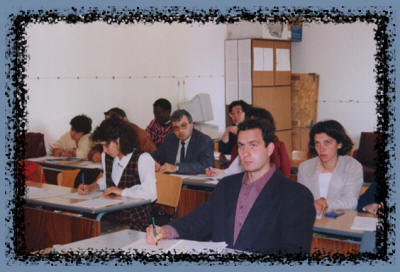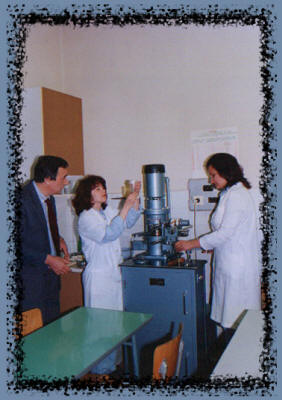
In 1987, ICTR and UNESCO approached a new initiative in higher
education. This approach later on became a norm in the training
industry and was labeled as Blended eLearning. The product of this
co-operation was the International Technological University (ITU).
ITU fulfilled the dream of some leaders of technological, industry
and some eminent academics in the field – a dream whose fulfillment
would make it possible for people in developing countries to be
educated and trained to the highest levels of modern technology.
ITU’s strength is apparent in the list of eminent academia,
educators and engineers who formed the Planning Board of ITU. These
experts helped develop its structure and programmes. Some members of
the Planning Board were as follows (positions were true at that
time):
Lord Perry of Walton, OBE, MD, DSc, FRCP, FRS (Chairman)
Former Vice Chancellor of the Open University, UK.
D A Blackburn, PhD
UNESCO, Paris

Sir Monty Finniston, FEng, DSc, FRS
Ex-Chairman on British Steel Corporation, UK
Professor G S Holister, MSc, PhD
Director of Technological Research & Higher Education, UNESCO
Dr Mr G J Leibbrandt
Secretary General, European Association of Distance Teaching
Universities, The Netherlands
Prof Dr Dr h c (mult) Otto Peters
FernUniversität Gesamthochschule, Hagen, Germany
How ITU
Works
International Technological University usually selects its courses
materials from existing high-quality courses prepared by eminent
academic institutions. This material is then modified as necessary
to include local relevant technologies. The course material will
then be assessed by external examiners to ensure that it is of the
highest possible standard and that the courses qualify for
professional recognition.
The courses comprise a mix of media including written texts,
audio-video materials, face to face tutorials, and if necessary,
supervised laboratory work appropriate to the needs of the subject.
The
Benefits
Those local educational institutions who co-operate with ITU to
implement ITU programmes in their institutions, benefit from the
following points:
• Access to high quality of teaching materials from eminent
international education institutes
• Access to new teaching methodologies
• Effective technology transfer
• Recognition courses by professional institutions in many countries
• Stimulation of local research activity
• Increased opportunities for collaboration with other academics
through access to an international network of academics and
educational institutions.
• Improved mobility and exchange of personnel between institutions
• Low cost – high quality education for their students
For many students whom access to higher education has previously
been impossible, there will be an opportunity to realise their full
potential.

International Masters Degree Programmes
To date ICTR has initiated, developed and managed a number of such
programmes in different countries. All these programmes have been
sponsored by the Commission of the European Communities (CEC)’s
TEMPUS Programmes. In each case programme objectives have been:
(a) To produce locally Masters graduates whose knowledge and skills are
in line with those of graduates graduating from good western
universities. In all cases highest possible quality standards have
been achieved through the services of independent external examiners
charged with the responsibility of ensuring that such standards are
achieved and maintained. They do so by monitoring the activities of
the programme and by making strategic interventions.
Candidates who complete the requirements of the course (passing
written and oral examinations as well as defending of a mandatory
thesis to be written by each candidate with a significant degree of
originality) and satisfy the examiners are awarded the European
Masters Degree Certificate which is advisedly unique in Europe.
(b) To upgrade knowledge and skills of local teachers involved in
programme to west European quality standards. Also, to upgrade and
update knowledge and skills of local in-service professionals from
government ministries and agencies, enterprises, universities and
institutions of higher education, Non-Governmental Organisations
(NGOs), research institutions etc. by enabling them to attend
lectures and practical classes (along with full-time students) on
one or more subjects that are professionally important to them.
(c) To change the existing academic culture of the host (beneficiary)
universities to west European culture with particular regard to
student and staff evaluation, the former based on both written and
oral examinations.

List of
ICTR’s educational programmes in Eastern Europe :
• European Masters Degree in Eco-oriented Mechanical Engineering
(1990-1993), Gdansk, Poland.
Beneficiary institution(s): Technical University of Gdansk.
Sponsor: Commission of the European Communities. Contract number:
CEC Tempus JEP-00028.
• European Masters Degree in Environmental Science & Engineering
(1990-1993), Budapest, Hungary.
Beneficiary institution(s): Technical University of Budapest; Eotvos
Lorand University, Budapest.
Sponsor: Commission of the European Communities. Contract number:
CEC Tempus JEP-00238.
• European Masters Degree in Eco-oriented Energy Management &
Mechanical Engineering (1991-
1994), Cluj-Napoca, Romania.
Beneficiary institution(s): Technical University of Cluj-Napoca and
Transylvania University of Brasov.
Sponsor: Commission of the European Communities. Contract number:
CEC Tempus JEP-03503.
• European Masters Degree in Environmental Monitoring, Control &
Health (1991-1994), Sofia, Bulgaria.
Beneficiary institution(s): University of Chemical Technology and
Metallurgy, Sofia, and ‘D. Tsenov’ Economic University, Svishtov,
Bulgaria.
Sponsor: Commission of the European Communities. Contract number:
CEC Tempus JEP-01815.
• European Masters Degree in Eco-Integrated Mechanical Engineering
(1994-1997), Gdansk, Poland*.
Beneficiary institution(s): Technical Universities of Gdansk and
Szeczecin.
Sponsor: Commission of the European Communities. Contract number:
CEC Tempus JEP-07206.

• European Masters Degree in Environmental Protection & Sustainable
Development (1994-1997), Sofia, Bulgaria. Beneficiary institution(s):
University of Chemical Technology and Metallurgy, Sofia, and ‘D.
Tsenov’ Economic University, Svishtov, Bulgaria.
Sponsor: Commission of the European Communities. Contract number:
CEC Tempus JEP-07209.
• European Masters Degree in Environmental Management (1993-1996),
Ankara and Alexandria.
Beneficiary institution(s): Ankara University and University of
Alexandria (Egypt).
Sponsor: Commission of the European Communities. Contract number:
CEC MED-CAMPUS #349 and #349B.
• European Masters Programme in Environmental Law (1996-1999), Ostrava,
The Czech Republic*.
Beneficiary institutions: Technical University of Ostrava and the
Ministry of Environment, Prague.
Sponsor: Commission of the European Communities. Contract number:
CEC Tempus JEP-11105.
* Responsible for initiating, developing and teaching/training, but
not for overall project management.
Other major
international projects initiated, organised and managed by ICTR
Project |
ICTR
responsible for |
Student
mobility (1990): CEC ERASMUS STV-89-0152 |
Initiation,
development, management (Brussels) |
Staff
training (1991): CEC Tempus JEP-03543 |
Course
development, teaching (Romania) |
Staff
training (1998): CEC Tempus JEP-12113 |
Curriculum
development, teaching, text writing (the Czech Republic) |
Staff
training (1999): CEC Tempus JEP-14102 |
Curriculum
development, teaching, text writing (the Czech Republic) |
Supervision
of post-doctoral students (1992): CEC PECO
(CIPA-CT-93-0641) |
Initiation,
development, management, teaching (Romania) |
Network
management (1992): CEC PECO
CIPA-3510-PL-928650 |
Initiation,
development, management (Hungary and Poland) |
Staff/student
training (1993): CEC MED-CAMPUS #147 |
Development,
teaching, training (Turkey) |
Staff
training (1997): CEC VNM/B7-6200/1B/96/05 |
Teaching,
training (Vietnam) |
Staff/student
training (1998): CEC Leonardo CZ/98/2/05295 |
Development,
teaching, training (the Czech Republic) |
Advanced
Research Workshop (1999): NATO ARW #974630 |
Initiation,
development, management of project in Sofia, Bulgaria |
NATO Special
Project #975991 (1999) |
This unique
NATO project, Sustainable Solid Waste Management in
Macedonia, awarded to Prof. B. Nath , had two main
elements: Activity 1 concerned with building a
high-specification landfill for solid waste in Struga (Macedonia); and Activity 2 concerned with teaching and
training of Macedonian SWM professionals in the theory and
practice of sustainable solid waste management. |
NATO CLG
(2002) #978643 |
Initiation,
development, management of project in Brussels and Sumi
(Ukraine). |
|




